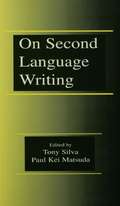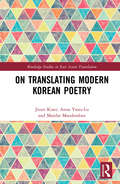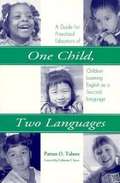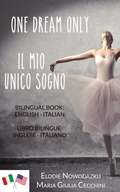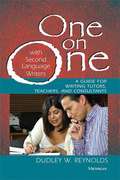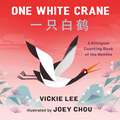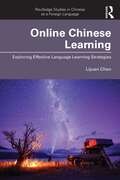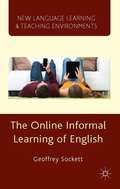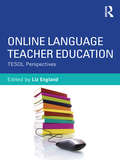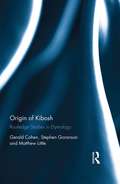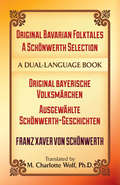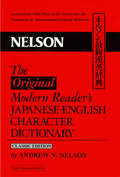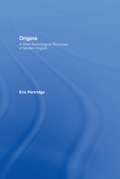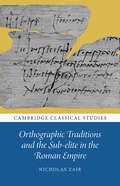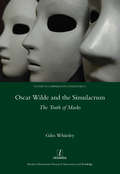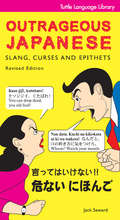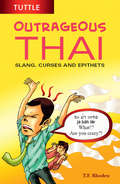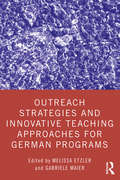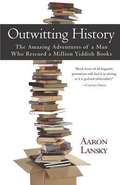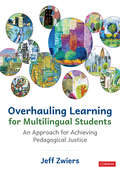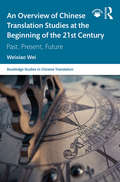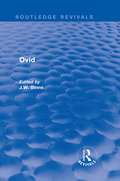- Table View
- List View
On Second Language Writing: Perspectives On The Process Of Knowledge Construction
by Tony Silva Paul Kei MatsudaOn Second Language Writing brings together internationally recognized scholars in a collection of original articles that, collectively, delineate and explore central issues with regard to theory, research, instruction, assessment, politics, articulation with other disciplines, and standards. In recent years, there has been a dramatic growth of interest in second-language writing and writing instruction in many parts of the world. Although an increasing number of researchers and teachers in both second-language studies and composition studies have come to identify themselves as specialists in second-language writing, research and teaching practices have been dispersed into several different disciplinary and institutional contexts because of the interdisciplinary nature of the field. This volume is the first to bring together prominent second-language writing specialists to systematically address basic issues in the field and to consider the state of the art at the end of the century (and the millennium).
On Translating Modern Korean Poetry
by Jieun Kiaer Anna Yates-Lu Mattho ManderslootOn Translating Modern Korean Poetry is a research monograph exploring the intricacies and complexities of translating modern Korean poetry. This monograph highlights the difficulties entailed in translating Korean poetry, due to the lexical, structural, social, expressive and attitudinal levels with which the translator must be engaged. Featuring all-new translations, this book explores the question of what exactly modern Korean poetry is, increases the representation of female poets and includes poems addressing modern historical events, globalization, diaspora and mental health. Each chapter provides commentary on both the original and translated texts and looks at some of the issues that arose during the translation process. By doing so the authors draw attention to the intricate, trans-cultural and trans-creational process of Korean poetry translation. Collating contemporary Korean poetry and intricately exploring the translation process, this book is ideal for researchers and advanced level students of Korean Studies, Translation Studies and Literature with an interest in translation.
One Child, Two Languages: A Guide for Preschool Educators of Children Learning English as a Second Language
by Patton O. TaborsA guide for teachers of preschoolers who come from homes where the dominant language is not English.
One Dream Only/Il mio unico sogno (Libro bilingue: inglese/italiano)
by Elodie Nowodazkij Maria Giulia CecchiniStai imparando l'inglese? Are you learning Italian? This book can help you with that: one page in English, one page in Italian ... Questo libro può aiutarti: una pagina è in inglese e una in italiano. She thought she was on her way to the top... Sixteen-year-old Natalya Pushkaya has one dream and one dream only: becoming the best ballerina ever. Dancing's always been who she is and she's working her hardest to land the main role of the School of Performing Arts' end-of-the-year showcase. But...will she make it? Within a week, Natalya's life will be changed forever. Credeva di essere sulla strada per il successo... La sedicenne Natalya Pushkaya ha un solo e unico sogno: diventare la più grande ballerina di sempre. La danza è sempre stata parte di lei, e ce la metterà tutta per ottenere il ruolo principale nello spettacolo di fine anno alla scuola di Discipline dello Spettacolo Ma... ci riuscirà? Nel giro di una settimana, la vita di Natalya cambierà per sempre.
One on One with Second Language Writers: A Guide for Writing Tutors, Teachers, and Consultants
by Reynolds Dudley W.One-on-one encounters with writers often contribute more to the development of student writing abilities than any classroom activity because they are personalized and responsive to individual needs. For the encounters to be successful, the writing tutor, teacher, or consultant must be prepared, must be knowledgeable of what it means to write and the factors that make writing more and less effective, and must also know the students. This guide focuses on what those who conference with second language writers need to know to respond best to students, recognize their needs, and steer conversations in productive directions. One on One with Second Language Writers provides tips about activities that can be adapted to individual contexts, student writing samples that can be analyzed for practice, a glossary, a list of useful resources, and a checklist for conferencing sessions. The book is appropriate for use in university and secondary school writing or learning centers, teacher training programs for both general composition and ESOL instructors, and as an individual reference tool. The book uses non-technical language where possible, but terminology is introduced where it might be useful when conferencing with students.
One White Crane: A Bilingual Counting Book of the Months
by Vickie LeeOne white crane, two black bears . . .Simply told and beautifully rendered, this counting board book takes young readers through the months of the year. Each month focuses on a new animal, from seals in May to cicadas in September. Sweet, accessible text in English and Chinese pairs with eye-catching art for a wonderful repeat reading experience.
Online Chinese Learning: Exploring Effective Language Learning Strategies (Routledge Studies in Chinese as a Foreign Language)
by Lijuan ChenOnline Chinese Learning aims to investigate the types of language learning strategies (LLSs) that online Chinese learners use across asynchronous and synchronous learning environments in different learning contexts.This book examines how the use of language learning strategies by online Chinese learners is influenced by the interactants; the characteristics of the specific learning context; and selected individual learner characteristics. This book will provide: (1) new and detailed information about students’ LLS use in online Chinese learning; (2) insights into how individual students adopt LLSs and technological tools to solve learning problems in various learning contexts; (3) an exploration of factors influencing LLS use; and (4) recommendations regarding LLS adoption, use, and training.This book will be a valuable resource for university instructors in languages, language teaching methods, and second language acquisition, as well as researchers in languages, linguistics, and language learning and teaching.
The Online Informal Learning of English
by Geoffrey SockettYoung people around the world are increasingly able to access English language media online for leisure purposes and interact with other users of English. This book examines the extent of these phenomena, their effect on language acquisition and their implications for the teaching of English in the 21st century.
Online Language Teacher Education: TESOL Perspectives
by Liz EnglandMore and more, ESL/EFL teachers are required by their employers to obtain a Master’s degree in TESOL. Thousands of ESL/EFL teachers are acquiring professional skills and knowledge through online and distance education instructional models. Filling a growing need and making an important contribution, this book is a forerunner in addressing some of the issues and problems for online distance learning and instructional delivery in TESOL and applied linguistics departments in universities around the world. Carefully addressing the complexity of the field, this volume includes primary research and case studies of programs where a variety of online distance models are used. Structured in a logical sequence, the readable and accessible content represents the collected expertise of leading language teacher educators. Each chapter brings the reader a better understanding and ability to apply knowledge about online distance TESOL education.
Origin of Kibosh: Routledge Studies in Etymology
by Gerald Cohen Stephen Goranson Matthew LittleThis is an etymological study of the origins of the word kibosh, which has long been one of the great mysteries of the English language. Unconvincing derivations have been suggested from Yiddish to Gaelic and Italian, and thus far consensus among lexicographers has leaned toward referencing the word as ‘origin unknown’. In this study, the authors present convincing and important new evidence in favour of the derivation of kibosh from the word for a fearsome Middle Eastern whip, known as the kurbash. This monograph is one of the most significant etymological works directed at a single phrase. It is the gold standard on deep-drill, focused and exhaustive single-word lexicography and will be of interest to lexicographers and linguists in the relevant fields.
Original Bavarian Folktales: Original bayerische Volksmärchen – Ausgewählte Schönwerth-Geschichten (Dover Dual Language German)
by Prof. M. Charlotte Wolf Franz Von SchönwerthFirst dual-language book available contains approximately 150 fairy and folk tales from a three-volume scholarly work collected by Franz von Schönwert and published in the 1850s. An introduction contains footnoted critical material on the German and East Bavarian stories as well as Schönwert and his legacy. Tales of giants, witches, death, and other subjects are grouped thematically.
The Original Modern Reader's Japanese-English Character Dictionary
by Andrew M. Nelson"The Japanese government may someday recognize-- as it ought to--Tuttle's contribution to creating an intelligent interest in Japan among the English-reading public, and deepening understanding of Japanese overseas."--Hokubei Mainichi (San Francisco)Awarded the 1969 Prize for the Society of the Promotion of International Cultural Relations, this is the most comprehensive Japanese book of its kind. Containing Japanese-English and English-Japanese sections, it is an essential reference tool for serious students studying the Japanese language or for business people and tourists wishing to learn Japanese before they travel.Special features include: Lists over 5,000 carefully selected characters with their 10,000+ current readings and almost 70,000 compounds in current use, al with concise English definitions. Scientifically arranged by a logical extension of the traditional radical system so as to make the finding of a given character almost fool-proof, saving hours of time. Makes provision for quickly finding characters either in their traditional or their modern and often greatly altered forms, thus serving for both prewar and postwar literature. Includes 14 valuable appendices giving (1) instructions for the most efficient use of the book, (2) discussions of the written language in general and particularly of its recent and far-reaching official modifications, and (3) much helpful
Origins: A Short Etymological Dictionary of Modern English (Routledge Revivals: The Selected Works Of Eric Partridge Ser.)
by Eric PartridgeThis etymological dictionary gives the origins of some 20,000 items from the modern English vocabulary, discussing them in groups that make clear the connections between words derived by a variety of routes from originally common stock. As well as giving the answers to questions about the derivation of individual words, it is a fascinating book to browse through, and includes extensive lists of prefixes, suffixes, and elements used in the creation of new vocabulary.
Orthographic Traditions and the Sub-elite in the Roman Empire (Cambridge Classical Studies)
by Nicholas ZairThis book makes use of digital corpora to give in-depth details of the history and development of the spelling of Latin. It focusses on sub-elite texts in the Roman empire, and reveals that sophisticated education in this area was not restricted to those at the top of society. Nicholas Zair studies the history of particular orthographic features and traces their usage in a range of texts which give insight into everyday writers of Latin: including scribes and soldiers at Vindolanda, slaves at Pompeii, members of the Praetorian Guard, and writers of curse tablets. In doing so, he problematises the use of 'old-fashioned' spelling in dating inscriptions, provides important new information on sound-change in Latin, and shows how much can be gained from a detailed sociolinguistic analysis of ancient texts.
Oscar Wilde and the Simulacrum: The Truth of Masks
by Giles WhiteleyOscar Wilde is more than a name, more than an author. From precocious Oxford undergraduate to cause celebre of the West End of the 1890s, to infamous criminal, the proper name Wilde has become an event in the history of literature and culture. Taking Wilde seriously as a philosopher in his own right, Whiteley's groundbreaking book places his texts into their philosophical context in order to show how Wilde broke from his peers, and in particular from idealism, and challenges recent neo-historicist readings of Wilde which seem content to limit his irruptive power. Using the paradoxical concept of the simulacrum to resituate Wilde's work in relation to both his precursors and his contemporaries, Whiteley's study reads Wilde through Deleuze and postmodern philosophical commentary on the simulacrum. In a series of striking juxtapositions, Whiteley challenges us to rethink both Oscar Wilde's aesthetics and his philosophy, to take seriously both the man and the mask. His philosophy of masks is revealed to figure a truth of a different kind - the simulacra through which Wilde begins to develop and formulate a mature philosophy that constitutes an ethics of joy.
Outrageous Japanese
by Jack SewardThis is a user-friendly and concise Japanese phrase book and guide to Japanese slang and Japanese curses.The Japanese are extraordinarily polite and soft-spoken people who are always indirect and evasive in their dealings with each other. Right? Well, not really. They can be just as explicit, vicious, vile and downright vulgar as anyone else when they want to be. This little gem of a book teaches you hundreds and hundreds of Japanese taunts, threats, curses and expletives that you'll never find in any dictionary-showing you how the Japanese really talk to one another when they are angry or emotional. Fun and entertaining, it will help you to read Japanese, write Japanese, and speak Japanese. It leaves no taboo untouched and sets the record straight. Learn how to call somebody a lecher, a deadbeat, a tub of lard, (and much worse than we can show here)-and arm yourself with phrases such as "Drop dead" or "what sewer did you crawl out of jackass? Fun and instructive, it is the perfect antidote for those boring language classes you have been taking, and your Japanese friends will die when they hear you trying out new expressions like tonji (pig-child) and dauma-geisha (fat-bottomed geisha).
Outrageous Japanese
by Jack SewardThis is a user-friendly and concise Japanese phrase book and guide to Japanese slang and Japanese curses.The Japanese are extraordinarily polite and soft-spoken people who are always indirect and evasive in their dealings with each other. Right? Well, not really. They can be just as explicit, vicious, vile and downright vulgar as anyone else when they want to be. This little gem of a book teaches you hundreds and hundreds of Japanese taunts, threats, curses and expletives that you'll never find in any dictionary-showing you how the Japanese really talk to one another when they are angry or emotional. Fun and entertaining, it will help you to read Japanese, write Japanese, and speak Japanese. It leaves no taboo untouched and sets the record straight. Learn how to call somebody a lecher, a deadbeat, a tub of lard, (and much worse than we can show here)-and arm yourself with phrases such as "Drop dead" or "what sewer did you crawl out of jackass? Fun and instructive, it is the perfect antidote for those boring language classes you have been taking, and your Japanese friends will die when they hear you trying out new expressions like tonji (pig-child) and dauma-geisha (fat-bottomed geisha).
Outrageous Japanese
by Jack SewardThis is a user-friendly and concise Japanese phrase book and guide to Japanese slang and Japanese curses.The Japanese are extraordinarily polite and soft-spoken people who are always indirect and evasive in their dealings with each other. Right? Well, not really. They can be just as explicit, vicious, vile and downright vulgar as anyone else when they want to be. This little gem of a book teaches you hundreds and hundreds of Japanese taunts, threats, curses and expletives that you'll never find in any dictionary-showing you how the Japanese really talk to one another when they are angry or emotional. Fun and entertaining, it will help you to read Japanese, write Japanese, and speak Japanese. It leaves no taboo untouched and sets the record straight. Learn how to call somebody a lecher, a deadbeat, a tub of lard, (and much worse than we can show here)-and arm yourself with phrases such as "Drop dead" or "what sewer did you crawl out of jackass? Fun and instructive, it is the perfect antidote for those boring language classes you have been taking, and your Japanese friends will die when they hear you trying out new expressions like tonji (pig-child) and dauma-geisha (fat-bottomed geisha).
Outrageous Thai: Slang, Curses and Epithets (Thai Phrasebook)
by T. F. RhodenThis is a user-friendly and concise Thai phrase book and guide to Thai slang and Thai curses.The Thai people love fun and laughter. They appreciate foreigners who speak their language.<P><P> But how would they react to foreigners who throw insults in the Thai language and know how to make them blush at the use of direct and vulgar Thai words? This Thai phrasebook, while designed to teach non-Thais to understand that spoken language on the street or in everyday life, also teachers powerful words. So, be cautious. A non-Thai, will appreciate the opportunity to learn some really strong and direct language that his Thai colleagues would rather he not know. Learn how to call someone hot or ugly, a walrus or a potbelly, stupid or a hypocrite. Know how to put off lechers by saying "Piss off!" in the strongest possible way. Not just a simple phrasebook, Outrageous Thai teaches how to really speak Thai, and understand the Thai language. Know what Thais really mean and answer back. Features of this Thai phrasebook are:Compact travel sizeHundreds of colorful Thai phrases organized by topic and useExtensive explanations of context and cultureAll phrases shown in written Thai script, Romanized Thai and English
Outreach Strategies and Innovative Teaching Approaches for German Programs
by Edited by Melissa Etzler Gabriele MaierOutreach Strategies and Innovative Teaching Approaches for German Programs explores recruitment, curricular design and student retention in modern language instruction by sharing best practices and a wide variety of pragmatic initiatives from teacher-scholars who have been involved in the successful building of German programs. With German programs facing dwindling grant monies as students across the country shift from the liberal arts into career-oriented fields, it is paramount to promote German programs vigorously, to offer courses that reflect and compel students’ interest, to keep students engaged in extracurricular activities and to establish a community of like-minded language learners. The combination of curriculum-based strategies coupled with innovative projects, and extracurricular and outreach activities is intended to serve as a guideline for teachers and scholars alike who are in need of best practices they can use to boost enrollment and attract and retain more students.
Outwitting History: The Amazing Adventures of a Man Who Rescued a Million Yiddish Books
by Aaron LanskyThe great Yiddish scholar Max Weinreich was delivering a lecture in Finland when the Nazis invaded his native Poland. The lecture saved his life. He made his way to New York, where he opened his doors to new students. Many thought his work was hopeless - especially since half of the world's Yiddish speakers had been killed in the Holocaust. Asked why he persevered, Weinreich answered simply: "Because Yiddish has magic, it will outwit history." And so it has, though in ways few could have imagined. In 1980, a twenty-three-year-old student named Aaron Lanksy set out to rescue the world's abandoned Yiddish books before it was too late. Precious volumes that had survived Hitler and Stalin were being passed down from older generations of Jewish immigrants to their non-Yiddish-speaking children, only to be thrown away or destroyed. With little more than his own chutzpah, Lansky issued a worldwide appeal for unwanted Yiddish books, and the response was overwhelming. Outwitting History is an adventure tale filled with unforgettable characters and told with the exuberance of a man whose passion led him from house to house, country to country, collecting treasured books and heartfelt, often hilarious stories of the vibrant intellectual world these older Jews inhabited. Lansky and a team of young volunteers crisscrossed America, schlepping books from attics and basements, demolition sites and Dumpsters one book at a time, their beloved literary history. When Lansky started out, experts believed that fewer than 70,000 Yiddish-language books still existed. Twenty-five years and 1.5 million books later, the organization Lansky founded, the National Yiddish Book Center, is one of the largest and fastest-growing Jewish cultural groups in the world. As he takes us along on his groundbreaking journey, Lansky explores the roots of the Yiddish language and introduces us to the brilliant Yiddish writers, from Mendele to Sholem Aleichem to I.B. Singer, whose lasting cultural relevance is evident on every page. He shares the humor, tenacity, and love for the written word that unites Jewish immigrants with everyone who cares about the future of great literature. And he enables us to see how an almost-lost culture is the bridge between the old world and the future. Includes discussion questions and activities.
Overhauling Learning for Multilingual Students: An Approach for Achieving Pedagogical Justice
by Jeff ZwiersAdopt a strengths-based, justice-centered approach to teaching multilinguals Offering educators a path to pedagogical justice for multilingual learners, Overhauling Learning for Multilingual Students outlines a comprehensive alternative model for instruction and assessment. With an emphasis on engaging multilingual learners in authentic communication and promoting student agency and creativity, this book is an urgent call-to-action for educators at all levels to value and leverage the many assets that multilingual students bring to every classroom. The book outlines six dimensions of pedagogical justice and offers practical strategies to implement a learner-centered approach that will help all students thrive. Additional features include: An assets-based framework designed to help multilingual learners learn and grow Guidance for shifting instructional strategies away from remediation and test preparation toward an engaging, justice-centered approach Activities to to help students collaboratively build up unique and important ideas (claims and concepts) across disciplines Written by scholar, practitioner, and best-selling author, Jeff Zwiers, Overhauling Learning for Multilingual Students supports educators to de-think and rethink traditional one-size-fits-all approaches to teaching and assessing multilingual learners.
Overhauling Learning for Multilingual Students: An Approach for Achieving Pedagogical Justice
by Jeff ZwiersAdopt a strengths-based, justice-centered approach to teaching multilinguals Offering educators a path to pedagogical justice for multilingual learners, Overhauling Learning for Multilingual Students outlines a comprehensive alternative model for instruction and assessment. With an emphasis on engaging multilingual learners in authentic communication and promoting student agency and creativity, this book is an urgent call-to-action for educators at all levels to value and leverage the many assets that multilingual students bring to every classroom. The book outlines six dimensions of pedagogical justice and offers practical strategies to implement a learner-centered approach that will help all students thrive. Additional features include: An assets-based framework designed to help multilingual learners learn and grow Guidance for shifting instructional strategies away from remediation and test preparation toward an engaging, justice-centered approach Activities to to help students collaboratively build up unique and important ideas (claims and concepts) across disciplines Written by scholar, practitioner, and best-selling author, Jeff Zwiers, Overhauling Learning for Multilingual Students supports educators to de-think and rethink traditional one-size-fits-all approaches to teaching and assessing multilingual learners.
An Overview of Chinese Translation Studies at the Beginning of the 21st Century: Past, Present, Future (Routledge Studies in Chinese Translation)
by Weixiao WeiAn Overview of Chinese Translation Studies at the Beginning of the 21st Century presents and analyses over 100,000 bibliographic notes contained within a large academic database focusing on translation within China. Exploring Chinese translation studies two decades before and after the year 2000, the book will introduce aspects of theory, culture, strategy, register, genre, and context to the field of translation in China, and will also take into account the impact of technology, education, and research within this field. Aimed at postgraduate students and researchers of translation studies, the focus of An Overview of Chinese Translation Studies at the Beginning of the 21st Century is the theory and practice of translation studies within a fast-paced and growing academic discipline.
Ovid (Routledge Revivals)
by J. W. BinnsOvid, Rome’s most cynical and worldly love poet, has not until recently been highly regarded among Latin poets. Now, however, his reputation is growing, and this volume is an important contribution to the re-establishment of Ovid’s claims to critical attention. This collection of essays ranges over a wide variety of themes and works: Ovid’s development of the Elegiac tradition handed down to him from Propertius, Catullus and Tibullus; the often disparaged and neglected Heroides; the poetry of Ovid’s miserable exile by the Black Sea; the poetic diction of the Metamorphoses, Ovid’s lengthy mythological epic which codified classical myth and legend, and has strong claims to be considered, with the exception of Virgil’s Aeneid, Rome’s greatest epic poem; humour and the blending of the didactic and elegiac traditions in the Ars Amatoria and Remedia Amoris. Finally, Ovid’s incomparable influence in the Middle Ages and sixteenth century is examined.
